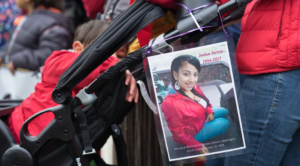Criminal justice experts say the removal of cash bail in Illinois could be an indicator for how other states move forward with systemic reform.
Why it matters: Though the Pretrial Fairness Act signed by Gov. JB Pritzker is seen as a step toward ending racial disparities, the problem remains with who gets picked and ultimately held in jail, Yannick Wood, director of the Criminal Justice Reform Program at New Jersey Institute for Social Justice, tells Axios.
- “If we can fix on the front end who is being detained, then we could necessarily impact the amount of people who are being incarcerated at the back end,” Wood said. “That’s really necessary when trying to target mass incarceration in New Jersey, in Illinois and any state in this country.”
- Illinois is among 12 states where more than half the prison population is Black.
What’s happening: The reform bill follows similar efforts in other states:
- New York and New Jersey have worked to reform their court systems in recent years.
- Defendants in California still must bear the costs of ankle monitors or other impositions to ensure they make court dates, after a state bill was voted down this year.
- The Policing Alternatives and Diversion Initiative (PAD) in Atlanta launched in 2016 to provide alternatives to arrest people in relation to mental illness, poverty or other issues.
Driving the news: With midterm elections about a month away, disinformation about the Illinois bill has come out in force, be it newspapers, television and even law enforcement challenging the bill in court to determine if it can be implemented.
- Conservative groups have said the bill will make it impossible to jail people for so-called “non detainable” offenses.
- Groups including the League of Women Voters’ of Illinois have published resources to help clarify what is fact and fiction.
Yes, but: Insha Rahman, vice president of advocacy and partnerships at the Vera Institute of Justice, tells Axios that reform efforts will not end the fact that Black people represent the majority of people incarcerated.
- “Bail reform in itself and having fewer people behind bars isn’t necessarily going to get at the gross race disparity that we see in the system,” Rahman says. “We need a separate set of interventions that really focus on race to make sure that we’re doing the racial justice aspect of what we intend to do with these reforms.”
What they’re saying: The Prison Policy Initiative, a nonprofit criminal justice think tank, reported in March 2020 that people of color, in particular Black Americans, make up 40% of the country’s jail and prison populations as they face a higher rate of poverty.
- Rachel Barkow, an NYU professor who specializes in criminal law, tells Axios that disparity in the court system stems from a plea deal the prosecution offers prior to a sentencing, all of which goes, without explanation, by someone’s criminal record or the charges they face.
- “It’s just an inexplicable fact other than the difference is noteworthy that you can see when you study these things is race,” Barkow said. “Every measure that you might think to look at, you’re going to unfortunately find those racial disparities.”
Flashback: The Pre-Trial Fairness Act was created to address criminal justice reforms in the state, including mandating police wear body cams by 2025, NPR reported.
- The bill was sponsored by Rep. Justin Slaughter and other Black members of the Illinois General Assembly.
What’s next: Criminal justice reform will be a point of discussion during the 2024 presidential elections, because there are opposing views — law and order versus building levels of equity — Lorenzo Boyd, a professor of community policing at the University of New Haven, tells Axios.
- “If people were to look at social justice, it’s fully in line with trying to keep people safe,” Boyd said. “When people look at bail reform as a racial issue, I think that they miss the point. Bail reform points to a poverty issue, and again it’s that level of poverty people don’t really want to talk about.”




